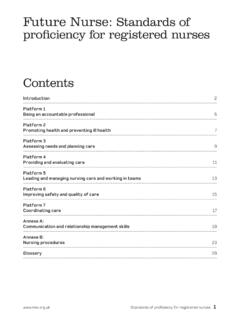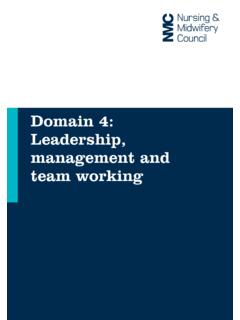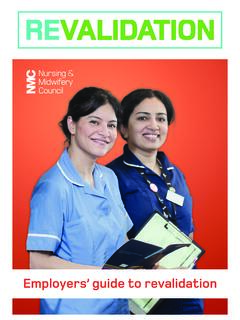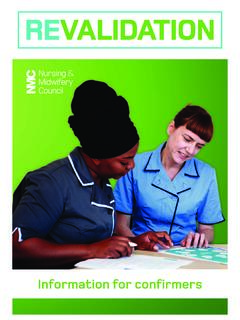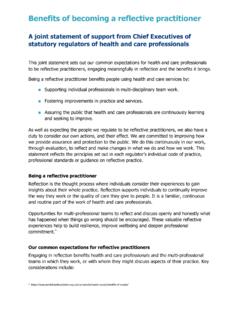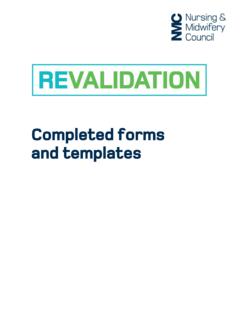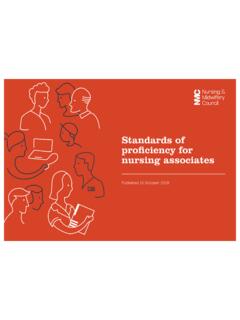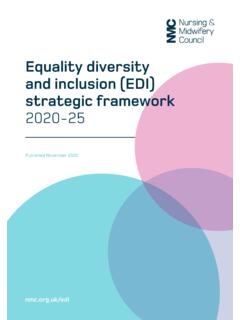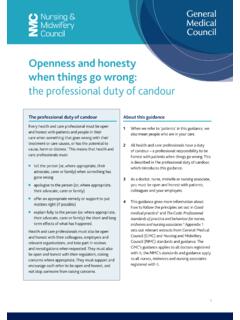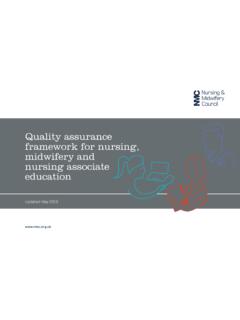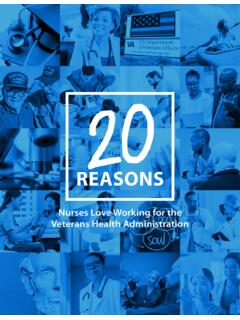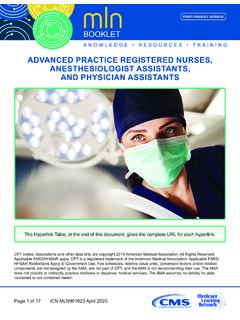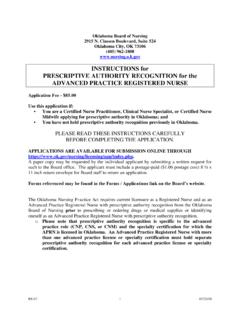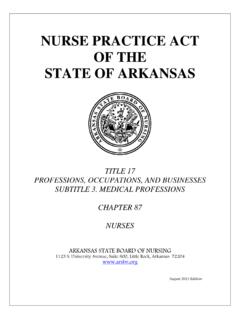Transcription of Future nurse: Standards of proficiency for registered nurses
1 Future nurse : Standards of proficiency for registered nurses Published 17 May 2018. Standards of proficiency for registered nurses 1. Contents Introduction 3. The role of the nurse in the 21st century 3. How the proficiencies have been structured 6. Platform 1. Being an accountable professional 7. Platform 2. Promoting health and preventing ill health 10. Platform 3. Assessing needs and planning care 13. Platform 4. Providing and evaluating care 16. Platform 5. Leading and managing nursing care and working in teams 19. Platform 6. Improving safety and quality of care 21. Platform 7. Coordinating care 24. Annexe A: Communication and relationship management skills 27. Annexe B: Nursing procedures 31. Glossary 38. Standards of proficiency for registered nurses 2. Future nurse : The role of the nurse in the 21st century registered nurses play a vital role in providing, leading and Standards of coordinating care that is compassionate, evidence-based, and person-centred.
2 They are accountable for their own actions and proficiency for must be able to work autonomously, or as an equal partner with a range of other professionals, and in interdisciplinary teams. registered nurses In order to respond to the impact and demands of professional nursing practice, they must be emotionally intelligent and resilient individuals, who are able to manage their own personal health and wellbeing, and know when and how to access support. Introduction registered nurses make an important contribution to the The Nursing and Midwifery Council has a duty to review the promotion of health, health protection and the prevention of Standards of proficiency it sets for the professions it registers ill health. They do this by empowering people, communities and on a regular basis to ensure that Standards remain contemporary populations to exercise choice, take control of their own health and fit for purpose in order to protect the public.
3 In reviewing the decisions and behaviours, and by supporting people to manage their Standards , we have taken into account the changes that are taking own care where possible. place in society and health care, and the implications these have for registered nurses of the Future in terms of their role, knowledge registered nurses provide leadership in the delivery of care for and skill requirements. people of all ages and from different backgrounds, cultures and beliefs. They provide nursing care for people who have complex The proficiencies in this document therefore specify the knowledge mental, physical, cognitive and behavioural care needs, those living and skills that registered nurses must demonstrate when caring with dementia, the elderly, and for people at the end of their life. for people of all ages and across all care settings. They reflect They must be able to care for people in their own home, in the what the public can expect nurses to know and be able to do in community or hospital or in any health care settings where their order to deliver safe, compassionate and effective nursing care.
4 Needs are supported and managed. They work in the context of They also provide a benchmark for nurses from the European continual change, challenging environments, different models of Economic Area (EEA), European Union (EU) and overseas wishing care delivery, shifting demographics, innovation, and rapidly evolving to join the UK register, as well as for those who plan to return to technologies. Increasing integration of health and social care practice after a period of absence. services will require registered nurses to negotiate boundaries and play a proactive role in interdisciplinary teams. The confidence and ability to think critically, apply knowledge and skills, and provide expert, evidence-based, direct nursing care therefore lies at the centre of all registered nursing practice. Standards of proficiency for registered nurses 3. About these Standards Standards specific for each pre-registration or post-registration programme.
5 Education institutions must comply with our Standards These Standards of proficiency apply to all NMC registered nurses . to be approved to run any NMC approved programmes. They should be read with Realising professionalism: Standards for education and training which set out our expectations Together these Standards aim to provide approved education regarding delivery of all pre-registration and post-registration institutions (AEIs) and their practice learning partners with the NMC approved nursing and midwifery education programmes. flexibility to develop innovative approaches to education for nurses , These Standards apply to all approved education providers and are midwives and nursing associates, while being accountable for the set out in three parts: Part 1: Standards framework for nursing local delivery and management of approved programmes in line with and midwifery education; Part 2: Standards for student supervision our Standards .
6 And assessment; and Part 3: Programme Standards , which are the Standards framework for nursing Standards and midwifery for student education supervision and assessment Standards of pro ciency Pre Programme Standards Standards for nursing for education and midwifery Post and training professions Standards of proficiency for registered nurses 4. Legislative framework Article 15(1) of the Nursing and Midwifery Order 2001. ( the Order') requires the Council to establish Standards for education and training which are necessary to achieve the Standards of proficiency for admission to the register, as required by Article 5(2) of the Order. The Standards for nursing and midwifery education providers are established under the provision of Article 15(1) of the Order. Article 5(2) of the Nursing and Midwifery Order 2001 requires the NMC to establish Standards of proficiency necessary to be admitted to each part of the register and for safe and effective practice under that part of the register.
7 The Standards of proficiency have been established under this provision. Standards of proficiency for registered nurses 5. Future nurse : The platforms are: 1. Being an accountable professional Standards of 2. Promoting health and preventing ill health proficiency for 3. Assessing needs and planning care 4. Providing and evaluating care registered nurses 5. Leading and managing nursing care and working in teams 6. Improving safety and quality of care How the proficiencies have been structured 7. Coordinating care The proficiencies are grouped under seven platforms, followed The outcome statements for each platform have been designed by two annexes. Together, these reflect what we expect a newly to apply across all four fields of nursing practice (adult, children, registered nurse to know and be capable of doing safely and learning disabilities, mental health) and all care settings.
8 This is proficiently at the start of their career. because registered nurses must be able to meet the person- centred, holistic care needs of the people they encounter in their Key components of the roles, responsibilities and accountabilities practice who may be at any stage of life and who may have a range of registered nurses are described under each of the seven of mental, physical, cognitive or behavioural health challenges. platforms. We believe that this approach provides clarity to the They must also be able to demonstrate a greater depth of public and the professions about the core knowledge and skills that knowledge and the additional more advanced skills required to they can expect every registered nurse to demonstrate. meet the specific care needs of people in their chosen fields of nursing practice. These proficiencies will provide new graduates into the profession with the knowledge and skills they need at the point of registration The annexes to these Standards of proficiency are presented in which they will build upon as they gain experience in practice and two sections.
9 The annexes provide a description of what registered fulfil their professional responsibility to continuously update nurses should be able to demonstrate they can do at the point of their knowledge and skills. For example, after they register with registration in order to provide safe nursing care. us registered nurses will already be equipped to progress to the Annexe A specifies the communication and relationship management completion of a prescribing qualification. skills required, and Annexe B specifies the nursing procedures that registered nurses must demonstrate that they are able to perform safely. As with the knowledge proficiencies, the annexes also identify where more advanced skills are required by registered nurses , working in a particular field of nursing practice. Standards of proficiency for registered nurses 6. Annexe A: Being an Promoting Assessing Leading and managing Improving Providing and Coordinating Communication Annexe B: accountable health and preventing needs and nursing care safety and evaluating care care and relationship Nursing procedures professional ill health planning care and working in teams quality of care management skills Platform 1.
10 Being an accountable professional registered nurses act in the best interests of people, putting them first and providing nursing care that is person-centred, safe and compassionate. They act professionally at all times and use their knowledge and experience to make evidence-based decisions about care. They communicate effectively, are role models for others, and are accountable for their actions. registered nurses continually reflect on their practice and keep abreast of new and emerging developments in nursing, health and care. Standards of proficiency for registered nurses 7. Annexe A: Being an Promoting Assessing Leading and managing Improving Providing and Coordinating Communication Annexe B: accountable health and preventing needs and nursing care safety and evaluating care care and relationship Nursing procedures professional ill health planning care and working in teams quality of care management skills 1.
